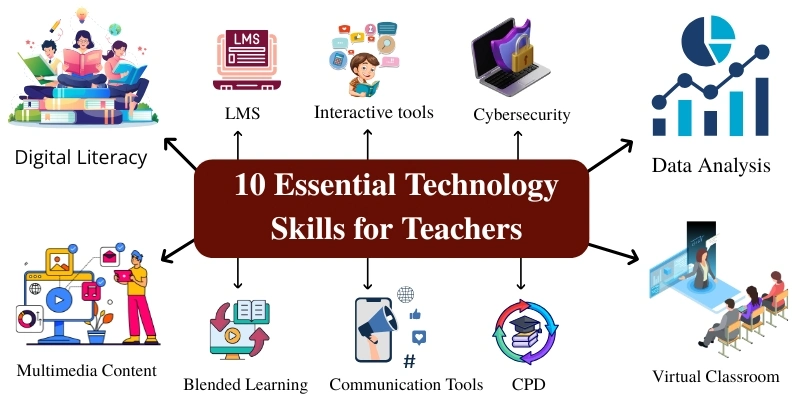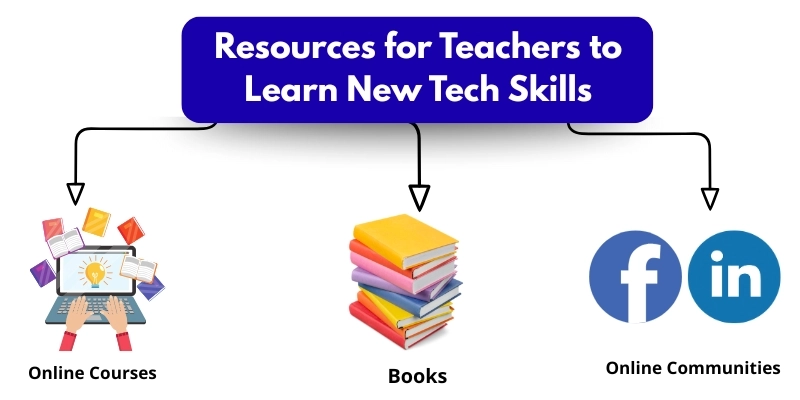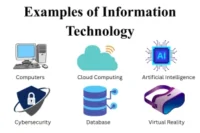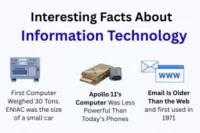10 Essential Technology Skills for Teachers to Boost Engagement in Classrooms
Published: 27 Aug 2025
As a consequence of the pandemic, technology has become a vital component of modern education. What was once a helpful teaching tool is now a must-have. Virtual classrooms, interactive educational platforms, and digital materials are no longer optional tools; they have become necessary.
Despite the growing popularity of technology in classrooms, many instructors still struggle with its practical application. Teachers may be unclear about where to start or how to effectively utilize these tools to enhance their teaching and engage students more effectively.
This article is here to help you learn technology skills for teachers. We’ll walk you through the key skills of technology that every teacher should have, along with practical tips for using them in the classroom.

Top 10 Essential Technology Skills Every Teacher Should Master
Here is the list of must have skills that every teacher should learn in 2025 to evolve as a digital facilitator.
1. Digital Literacy
Digital literacy is the ability to use technology effectively and critically. It is the first step toward becoming experienced with educational technology. Without a basic understanding of digital literacy, teachers may struggle to utilize advanced tools effectively.
Actionable Tip:
Begin by learning how to utilize popular digital devices, applications, and software that are used in schools. Learn how to use systems such as Google Classroom and Microsoft Office Suite, as well as fundamental troubleshooting strategies.
Tools & Resources:
- Google Classroom: Manage and organize classroom activities.
- Microsoft Office Suite: Essential tools for creating documents, presentations, and spreadsheets.
- Basic Troubleshooting Guides: Quick fixes for common digital issues.
2. Learning Management Systems (LMS)
MS platforms make it easier to arrange coursework, manage assessments, and engage with students. Mastering these technologies can help teachers become more productive by streamlining administrative work and improving communication with students and parents.
Actionable Tip:
Learn how to utilize programs such as Google Classroom, Moodle, and Canvas to create and grade assignments, track student progress, and provide feedback.
Tools & Resources:
- Google Classroom: A straightforward platform from Google for managing assignments.
- Moodle: Open-source LMS popular in many schools and Colleges.
- Canvas: A user-friendly LMS with extensive features for teachers and students.
3. Interactive & Collaborative Learning Tools
Interactive tools encourage student participation and enhance engagement, resulting in improved learning outcomes. These tools are great for group activities, real-time quizzes, and collaborative projects.
Actionable Tip:
Utilize various interactive and collaborative learning tools for brainstorming sessions or group work.
Tools & Resources:
- Jamboard: An interactive whiteboard for collaborative lessons. These tools are used for brainstorming sessions or class activities.
- Padlet: A platform for sharing and organizing student content.
- Kahoot: A quiz tool that enhances student engagement through games and quick quizzes.
4. Data Analysis and Adaptive Learning Tools
Using student data helps teachers make informed decisions. Analyzing student progress enables teachers to tailor lessons to individual needs and enhance learning outcomes.
Actionable Tip:
Use Google Forms to create quizzes and formative assessments. Analyze responses to adjust your lessons and offer tailored support.
Tools & Resources:
- Google Analytics: Track and diagnose student data in detail.
- Quizlet: Create study sets to help support lessons.
- Edulastic: Use this tool for real-time data on assessments.
5. Cybersecurity & Digital Safety
As more classrooms transition to online platforms, ensuring digital safety is crucial. Teachers should be aware of online risks and guide students in practicing safe online behavior.
Actionable Tip:
Teach students about digital applications and technologies, including how to protect personal data and recognize phishing attempts.
Tools & Resources:
- Cybersecurity Awareness Courses: Learn How to Protect Your Online Spaces.
- Common Sense Media’s Digital Citizenship Curriculum: A resource to teach students about online safety.
6. Multimedia Content Creation
Multimedia technologies enable teachers to generate dynamic learning resources such as movies, podcasts, and infographics. These materials appeal to a variety of learning styles and help improve knowledge memory.
Actionable Tip:
Utilize various technologies and tools to create infographics, short instructional videos, and record podcasts for educational lessons.
Tools & Resources:
- Canva: Easy to use for graphic design and presentations.
- WeVideo: Create educational videos for student engagement.
- Audacity: Free software for creating and editing podcasts.
7. Virtual Classroom Management
Managing a virtual classroom differs from typical in-person teaching. It takes methods to keep children engaged and maintain good behavior.
Actionable Tip:
Set clear virtual classroom expectations. Use breakout rooms for group activities and interactive features like polling or Q&A to keep students involved.
Tools & Resources:
- Zoom: Made high-resolution Video conferencing with breakout rooms and interactive tools.
- Microsoft Teams: Collaboration platform for online classes.
- Google Meet: For virtual classes and student interactions.
8. Blended Learning and Flipped Classroom Techniques
Blended learning combines online resources and in-person instruction. It’s an excellent approach to using digital tools while maintaining face-to-face interactions.
Actionable Tip:
Use internet quizzes and movies to enhance classroom teaching. Try a flipped learning approach, in which students learn information at home and participate in more in-depth discussions or activities during class.
Tools & Resources:
- EdPuzzle: Add questions to videos for use in a flipped classroom.
- Socrative: Create real-time quizzes to enhance learning.
9. Communication & Collaboration Tools
Clear communication with students and parents is essential, particularly in virtual environments. Teachers must be comfortable using messaging tools, holding conferences, and exchanging information.
Actionable Tip:
Teachers can use technical skills for sending messages and Host parent-teacher conferences via Google Meet or Zoom to stay connected with families.
Tools & Resources:
- Remind: A messaging platform for communicating with students and parents to solve their problems virtually.
- Google Meet: For hosting video meetings and conferences.
10. Continuous Professional Development (CPD) in EdTech
Teachers’ abilities must be constantly updated as educational technology improves. Ongoing professional development keeps them up to speed on the newest technologies and instructional practices.
Actionable Tip:
Stay up-to-date on EdTech developments by participating in webinars, online courses, and professional groups. Participate in EdTech-focused programs through sites such as Coursera.
Tools & Resources:
- Coursera: Offers online courses in EdTech and other educational fields.
- EdTech Blogs: Follow blogs to stay informed on the newest tools and trends.
Why Technology Skills Are Crucial for Teachers in 2025
Want to know why learning tech skills are important for teachers in this modern era of technology? Let’s discuss two main reasons.
The Digital Transformation in Education and Its Impact on Teaching Methods
In the modern world, technology is more than simply a supplement to conventional education. It has become the primary focus of modern education. The transition to digital learning has changed the way teachers deliver classes, students engage with information, and the overall learning experience.
Teachers are regularly required to include digital technologies, such as learning management systems (LMS), multimedia materials, and interactive tools, to make learning interesting, engaging, and accessible.
The Need for Teachers to Evolve as Digital Facilitators
The role of teachers has undergone considerable shifts. Teachers are no longer the only providers of information. Today, they serve as digital facilitators, directing students through a massive array of online information and interactive learning opportunities.
Teachers must not only be acquainted with digital technologies but also adapt their teaching techniques to promote autonomous learning, critical thinking, and digital literacy.
Teachers must consider technology as a tool for enhancing learning rather than simply a means of managing work. To stay up with the digital world, educators must transition from traditional teaching techniques to more student-centered approaches. These techniques utilize technology to meet the diverse needs of all learners.

Resources for Teachers to Learn New Tech Skills
Continuous learning and support are essential for educators who want to integrate technology into their teaching methods. Here are some Recommended Online Courses, Books, and Communities for Educators to help teachers build and enhance their EdTech skills:
1. Online Courses
Here are some online courses teachers can join to build technology skills for education. Three of the best options include:
- Coursera (EdTech Specialization)
- Google for Education Training Center
- edX
2. Books
Here are some books teachers can read to learn technology integration in education. Three of the best options include:
- The EdTech Coach by Roby Durán
- Blended Learning by Heather Staker
- Teaching with Technology by Judith L. Green
3. Communities
Here are some communities teachers can join to share ideas and learn about educational technology. Three of the best options include:
- Facebook Groups for EdTech Teachers
- Twitter EduChats using hashtags like #EdTech and #EdChat
- LinkedIn Learning communities and groups
Conclusion
Mastering basic technology skills is no longer optional for today’s teachers because it has become essential. Technology has transformed how we teach and learn, making it a powerful tool for creating engaging and effective classrooms.
By becoming experienced in EdTech tools, teachers can improve student attention, improve learning outcomes, and manage classrooms more effectively.
These technology skills for teachers, such as acquiring digital literacy and employing data-driven tools for customized learning, contribute to more dynamic teaching. They also prepare students to succeed in a digital environment.
Start today and transform your teaching with the power of technology. The future of education is in your hands!
Questions About Technology Skills for Teachers
Here are some common FAQs people search about learning tech skills as a teacher.
Teachers utilize technology to set up classes, convey material, track student progress, and engage students via videos, interactive tools, and online resources. It also facilitates communication with parents and students.
A technology teacher should understand how to utilize computers, software, touchscreens, online learning platforms, and common issues. They should also feel comfortable teaching students how to use these technologies safely and successfully.
Here are some of the best skills Mark recommends for teaching your students using new technology and tools:
- Clear communication
- Patience and empathy
- Classroom management
- Creativity
- Adaptability
- Technology skills
Teachers with technology skills may better prepare their students for the modern world, make classes more engaging and participatory, and save time by utilizing digital planning and grading tools.
Technology skills enable instructors to make classes more engaging, save time on planning and assessments, and prepare students for a digital future. They also make it easier to reach and support a diverse range of learners.
Every instructor should understand how to utilize email, word processors, presentations, spreadsheets, and online educational resources. It also helps to know how to browse the internet securely and use digital tools in the classroom.

- Be Respectful
- Stay Relevant
- Stay Positive
- True Feedback
- Encourage Discussion
- Avoid Spamming
- No Fake News
- Don't Copy-Paste
- No Personal Attacks



- Be Respectful
- Stay Relevant
- Stay Positive
- True Feedback
- Encourage Discussion
- Avoid Spamming
- No Fake News
- Don't Copy-Paste
- No Personal Attacks





